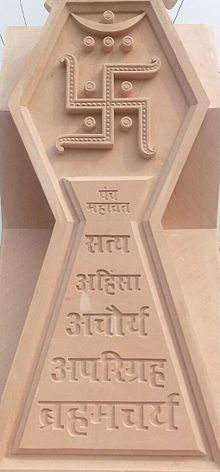Jain ethical code prescribes two dharmas or rules of conduct. One for those who wish to become ascetic and another for the śrāvaka (householders). Five fundamental vows are prescribed for both votaries. These vows are observed by śrāvakas(householders) partially and are termed as anuvratas (small vows). Ascetics observe these fives vows more strictly and therefore observe complete abstinence.
These five vows are:
- Ahiṃsā (Non-violence)
- Satya (Truth)
- Asteya (Non-stealing)
- Brahmacharya (Chastity)
- Aparigraha (Non-possession)
Maha vratas (major vows)
Mahavrata (lit. major vows) are the five fundamental observed by the Jain ascetics. According to Acharya Samantabhadra’s Ratnakaraņdaka śrāvakācāra:
Abstaining from the commitment of five kinds of sins (injury, falsehood, stealing, unchastity, and attachment) by way of doing these by oneself, causing these to be done, and approval when done by others, through the three kinds of activity (of body, speech, and thought), constitutes the great vows (mahāvrata) of celebrated ascetics.
Ahiṃsā
Ahimsa (non-injury) is formalised into Jain doctrine as the first and foremost vow. According to the Jain text, Tattvarthsutra: “The severance of vitalities out of passion is injury.”
Satya
Satya is the vow to not lie, and to speak the truth.[5] A monk or nun must not speak the false, and either be silent or speak the truth.[6] According to Pravin Shah, the great vow of satya applies to “speech, mind, and deed”, and it also means discouraging and disapproving others who perpetuate a falsehood.
The underlying cause of falsehood is passion and therefore, it is said to cause hiṃsā (injury).
Asteya
Asteya as a great vow means not take anything which is not freely given and without permission.[10] It applies to anything even if unattended or unclaimed, whether it is of worth or worthless thing. This vow of non-stealing applies to action, speech and thought. Further a mendicant, states Shah, must neither encourage others to do so nor approve of such activities.[7]
According to Tattvarthasutra, five observances that strengthen this vow are:
- Residence in a solitary place
- Residence in a deserted habitation
- Causing no hindrance to others,
- Acceptance of clean food, and
- Not quarreling with brother monks.
Brahmacharya
Brahmacharya as a great vow of Jain mendicants means celibacy and avoiding any form of sexual activity with body, words or mind. A monk or nun should not enjoy sensual pleasures, which includes all the five senses, nor ask others to do the same, nor approve of another monk or nun engaging in sexual or sensual activity.
Aparigraha
According to Tattvarthsutra, “Infatuation is attachment to possessions”. Jain texts mentions that “attachment to possessions (parigraha) is of two kinds: attachment to internal possessions (ābhyantara parigraha), and attachment to external possessions (bāhya parigraha).
The fourteen internal possessions are:
- Wrong belief
- Six defects
- Laughter
- Liking
- Disliking
- Sorrow
- Fear
- Disgust
- Four passions
- Anger
- Pride
- Deceitfulness
- Greed
External possessions are divided into two subclasses, the non-living, and the living.
According to Jain texts, both internal and external possessions are proved to be hiṃsā (injury).


